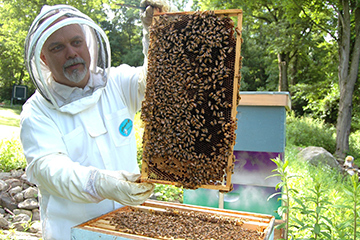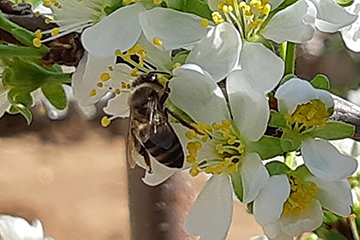Protecting bees in the Western Cape
 More than 50 different crops in South Africa are reliant on the existence and work of the honey bee. Thanks to these busy workers, we can produce apples, pears, citrus, and other fruits that make up a major export market. The survival of the honey bee and South Africa’s R7 billion a year fruit industry has come under threat.
More than 50 different crops in South Africa are reliant on the existence and work of the honey bee. Thanks to these busy workers, we can produce apples, pears, citrus, and other fruits that make up a major export market. The survival of the honey bee and South Africa’s R7 billion a year fruit industry has come under threat.
The decline in pollinators is a result of many environmental challenges, such as the change in habitat, loss of floral resources, pesticides, pests, diseases, and the growing effects of climate change.
Pollinators, such as honey bees, provide a wide range of benefits to humans. Our well-being depends heavily on various ecosystems and their functions. To a large extent, pollinators drive and maintain the good health of these ecosystems. Pollination is the transfer of pollen from the male to the female parts of a flower that results in the forming of fruit. Most fruit, seed and berry crops are dependent on insects, especially honey bees, to ensure a fruit or seed are produced.
The important roles of bees
- Bees sustain populations of wild plants that support most biodiversity and ecosystem functions.
- Bees are the most important group of pollinators, visiting more than 90% of the leading 107 global crop types.
- In South Africa, over 50 crops are dependent on bee pollination. This means, bees ensure a reliable and diverse seed and fruit supply through pollination. There’s also the improvement of crop production and quality through proper pollination. Research shows that the use of commercial honey bees for pollination improves fruit set, fruit weight, and quality.
- Recently, it's become clear that pollinator-dependent crops are the main sources of many micronutrients, including vitamins A and C, calcium, fluoride and folic acid 10. Bees pollinate most of these crops.
- Bees contribute, indirectly, to job creation and employment, both at beekeeping and farm (produce harvesting) level. This is a huge contribution to food security and poverty alleviation.
- The sales of honey and other bee-related products (such as propolis and beeswax) also generate income.
- Bees have also been shown to promote and maintain both traditional and cultural values. In South Africa, the early association of honey bees and humans are depicted in the rock art of the San Bushmen.
 What are the threats to bee populations?
What are the threats to bee populations?
- Habitat loss: Most species are dependent on specific structures such as plants and nesting sites. Modern agriculture plays a role in destroying their habitat.
- Pesticides: Poisonous or incorrectly mixed pesticides play a role in poisoning and killing bees.
- Pollution: Air and environmental pollution affect the bee colonies.
- Climate change: Fires and drought destroy the habitat of bees.
- Diseases and parasites: Bees are susceptible to diseases such as the American foulbrood (AFB). Beekeepers should keep their hive tools, hands, and equipment clean at all times to aid the prevention of hive contamination.
What are we doing to protect bee populations?
The South African Bee Industry Organisation estimates that one-third of the honey bees in the Western Cape are now infected with AFB.
To prevent a rapid outbreak, the Western Cape Department of Agriculture, together with bee associations in the province are working on a plan to protect the bee population in the province.
The strategy will look at bee forage, research needs, and industry regulations among strategic solutions.
Read the full strategy on sustaining our honey bee population and apiculture (beekeeping) in the Western Cape.
What you can do to help bees

We can all play a role to help bees. Here are a few ways you can step in and help:
- Plant as many native flowers in your yard or garden as possible. They provide great sources of nectar and pollen (both food for the bees and butterflies). Bees need to have a diverse and regular food supply.
- Buy locally produced honey (or raw honey). Smaller-scale beekeepers are more likely to treat their bees more humanely.
- Create bee sanctuaries in your garden. Build structures around your garden that will attract bees and give them a place to nest.
- Leave buckets of water around. Bees get thirsty, and often in the areas where we live there is water scarcity. When you leave a watering can or bucket in your garden, don’t add sugar to it.
- Avoid using any pesticides.
5 tips to help save the bees
- Rethink the manicured lawn
Let your lawn grow a little more freely than you ordinarily would so that you allow dandelions, clover, and other bee-friendly plants to grow in your garden and yard.
- Community gardens
The benefits of a community garden go way beyond helping our bee population. Community gardens help improve air and soil quality, increase plant and animal biodiversity, and when you plant fruit, vegetable and grain crops, you’ll have a source of fresh free food that doesn’t need to be “trucked in” to your community.
- Keep away from toxic chemicals-
Bees don’t stand a chance against toxic chemicals designed to kill weeds and pests.
What you don’t see right away are the effects on you, your family and your pets. Try using organic solutions for weed and pest removal. A quick search on Google usually provides good organic bee-friendly solutions to your specific weed or pest problem.
- No-kill bee removal solution
When bees nest inside your home you might be inclined to grab a can of pesticide and get them out. Or, you might call an exterminator who’ll use toxic chemicals and wipe out the entire colony.
However, you should always consider a bee-friendly and humane option that will keep the bee colony intact and relocate them. Many pest removal services are educated about the plight of the honey bee and now offer humane bee removal alternatives always enquire beforehand. Contact your local beekeeping association or search online for “humane bee removal” or “live bee removal” to find a local company.
pest removal services are educated about the plight of the honey bee and now offer humane bee removal alternatives always enquire beforehand. Contact your local beekeeping association or search online for “humane bee removal” or “live bee removal” to find a local company.
- Find out where your honey comes from
Always make sure that what you're consuming is in fact 100% honey. Many companies add corn-based sweeteners to make up for quantity, this is usually true for honey sourced from multiple countries of origin. Make sure the label reads 100% pure honey or even better, look for organic honey and do some research about honey producing companies beforehand.
Cheap, highly processed honey is very likely to be manufactured by companies that aren’t concerned about the treatment of bees and the quality of the honey. The honey you can get from small local beekeepers is typically raw in its sweet, pure, most natural state. It’s minimally filtered and processed and contains protein-packed bee pollen and enzymes, but most importantly is sustainable.


